|
|
 |
 |
 |
 |
IISD Reporting Services (IISD RS) Coverage
IISD RS has provided daily web coverage and a summary reports from these events. In order to download our reports, click the HTML or PDF icons below. |
|
 |
 |
 |
 |

|
 Fifth session of the International Renewable Energy Agency’s (IRENA) Assembly and IRENA events at the World Future Energy Summit (WFES) Fifth session of the International Renewable Energy Agency’s (IRENA) Assembly and IRENA events at the World Future Energy Summit (WFES)
16-21 January 2015 | Abu Dhabi, United Arab Emirates (UAE)
|
Summary Highlights of the Meeting
 |
 |
 |
 |
On Friday, 16 January 2015, a number of pre-IRENA Assembly events took place throughout the day.
An event on challenges and opportunities for renewable energy in Latin America took place in the morning and afternoon. The main elements of IRENA’s Working Paper on Renewable Energy in Latin America was presented, wherein it was noted that although solar and wind energy are gaining momentum in renewable energy investments, vast geothermal resources remain largely unexploited. Participants discussed potential collaboration between Latin America and the Caribbean region with IRENA. The Geothermal Development Facility for Latin America, launched at UNFCCC COP 20 by 14 donors was highlighted.
An event on renewable energy from the sea considered the technological status and outlook for ocean energy. The Global Atlas for Renewable Energy, which aims to bridge the divide between countries that have access to data sets, expertise, and financial support to evaluate their national renewable energy potential and those that do not, was presented.
The environmental impact of renewable energy technologies was considered during another side event. An overview of IRENA’s environmental projects and proposed future direction described how this work promotes the widespread adoption and sustainable use of renewable energy technologies by facilitating collaborative action and providing tools to support policymakers and investors. Perspectives were provided from the geothermal and wind energy sectors. The use of strategic environmental impact assessments to explore alternative renewable energy scenarios as well as solutions to mitigate the social and environmental impacts of geothermal operations in Italy and the US was also considered.
 Visit the web coverage for Friday, 16 January 2015. Visit the web coverage for Friday, 16 January 2015.
 Download the summary report of the Fifth IRENA Assembly in HTML or PDF format. Download the summary report of the Fifth IRENA Assembly in HTML or PDF format. |
|
 |
 |
 |
 |
|
|
 |
 |
 |
 |
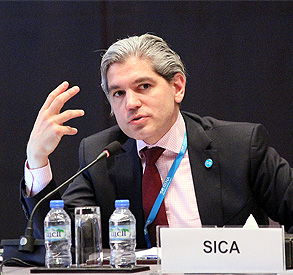 |
| Aldo Flores-Quiroga, Secretary-General, International Energy Forum (IEF) |
|
 |
 |
 |
 |
|
 |
 |
 |
 |
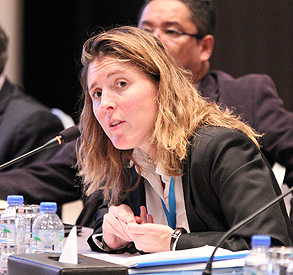 |
| Marietta Sander, Executive Director, International Geothermal Association (IGA) |
|
 |
 |
 |
 |
|
 |
 |
 |
 |
Members convened for the opening of the fifth IRENA Assembly on Saturday. The President of the fourth session, Pedro Joaquín Coldwell, Minister of Energy, Mexico, welcomed participants noting the clear need for an intergovernmental agency that acts as a global convener on renewable energy matters. The Assembly first addressed organizational matters and elected Yoichi Miyazawa and Yasuhide Nakayama (Japan) as Co-Presidents of the fifth session. Vladimir Shkolnik (Kazakhstan), Davis Chirchir (Kenya), Mike Allen (New Zealand) and Guillermo Shinno (Peru) were elected as Vice-Presidents. The Assembly elected Italy as Rapporteur. Co-President Miyazawa noted that IRENA’s membership has grown in four years, which demonstrates the high expectations for renewable energy. Co-President Nakayama emphasized that Japan is the second largest contributor to IRENA and is determined to play a leading role in renewable energy deployment with US$850,000 provided in 2014.
IRENA Director-General Amin presented the Annual Report of the Director-General. Director-General Amin highlighted the the implementation of the work programme and budget for 2014-2015 (A/5/3), stressing that innovation, new financial mechanisms and dramatically lowered costs mean “renewable energy poses a positive disruptive momentum to the global energy system. During interventions, many members commended IRENA for its work and progress in 2014 and highlighted national renewable energy initiatives.
Adnan Amin was reappointed as IRENA’s Director-General for a second four-year term. Many members took the floor to express support for Director-General Amin, lauding his stewardship of IRENA.
Members also convened in a ministerial roundtable to consider power sector transformation and held a programmatic discussion on renewable power generation costs.
 Visit the web coverage for Saturday, 17 January 2015. Visit the web coverage for Saturday, 17 January 2015.
 Download the summary report of the Fifth IRENA Assembly in HTML or PDF format. Download the summary report of the Fifth IRENA Assembly in HTML or PDF format.
|
|
 |
 |
 |
 |
 |
 |
 |
 |
On Sunday morning, members convened in plenary for consideration of institutional matters and a programmatic discussion on off-grid renewable energy deployment. A ministerial roundtable on the role of renewable energy in energy security took place in parallel.
A strategic discussion on renewable energy and climate change was also held later in the morning. Christiana Figueres, Executive Director, UNFCCC, stressed that the transition to renewables is already underway, unstoppable and “stands on its own two feet” outside of the climate negotiations. Ségolène Royal, Minister of Ecology, Sustainable Development and Energy, France, said the incoming COP 21 Presidency was an honor, but also an obligation to succeed. She expressed her full support for IRENA’s work, particularly with African and Island states. Rómulo Acurio Traverso, Deputy Representative for Climate Change, Peru, highlighted the success of COP 20 in capitalizing the GCF, engaging stakeholders and working towards a legally binding agreement with the Lima Call for Climate Action.
During a lunchtime event, IRENA and the Abu Dhabi Fund for Development (ADFD) announced US$57 million in concession loans for five renewable energy projects in Argentina, Cuba, Iran, Mauritania, and Saint Vincent and the Grenadines.
The Secretariat presented REsource, an open platform that compiles IRENA’s data on renewable energy statistics, policies, markets and other topics into a single online access point.
A strategic discussion on a future strategy for financing the Agency took place in the afternoon. Director-General Amin concluded that the fifth Assembly sends out the clear message that renewable energy is growing in importance worldwide. The meeting closed at 6:45pm.
 Visit the web coverage for Sunday, 18 January 2015. Visit the web coverage for Sunday, 18 January 2015.
 Download the summary report of the Fifth IRENA Assembly in HTML or PDF format. Download the summary report of the Fifth IRENA Assembly in HTML or PDF format.
|
|
 |
 |
 |
 |
 |
 |
 |
 |
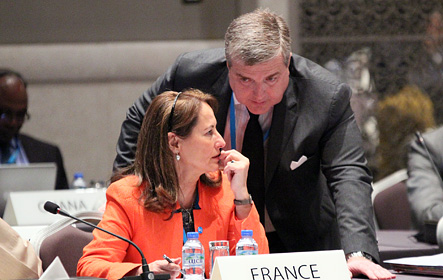 |
| Ségolène Royal, Minister of Ecology, Sustainable Development and Energy, France, consulting with another delegate |
|
 |
 |
 |
 |
|
 |
 |
 |
 |
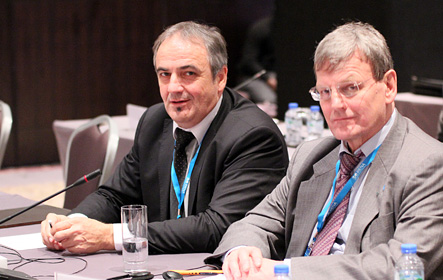 |
| Heinz Krier, Fraunhofer and Eicke R. Weber, Director of the Fraunhofer Institute for Solar Energy Systems |
|
 |
 |
 |
 |
|
 |
 |
 |
 |
On Monday, 19 January 2015, participants at the World Future Energy Summit (WFES) attended a number of IRENA events including “Regional renewables: power without borders”, “Socio-economic benefits of solar and wind energy” and “Funding opportunities for renewable energy projects in developing countries through the IRENA/Abu Dhabi fund for development project facility”.
During the session on power without borders participants highlighted, among others, IRENA’s new Regulatory Empowerment Project the importance developing regional institutions and transmission infrastructure, IRENA’s work on regional clean energy corridors and the results of a soon-to-be-published IRENA report on the lessons learnt from Swedish-Norwegian certificate market.
Participants at the session on the socio-economic benefits of solar and wind energy highlighted IRENA’s Multilateral Solar and Wind Working Group’s econValue project to analyze the socio-economic benefits of renewable energy deployment, policies in the socioeconomic value chain that support deployment of renewable energy at country or regional level, tradeoffs and priority issues for optimizing socio-economic benefits of renewable energy and the link between renewable energies and economic growth.
In the session on funding opportunities, Seleha Lockwood, IRENA, explained that the UAE pledged US$350 million in concessional loans over seven annual cycles through the Abu Dhabi Fund for Development (ADFD) for renewable energy projects recommended by IRENA in developing countries. She described the application process for the loans and noted that in the first cycle US$41 million in concessional loans was allocated with US$42 million from other sources, which resulted in 21 MW of new capacity. Beneficiaries included Ecuador, Mali, Maldives, Mauritania, Samoa and Sierra Leone.
 Visit the web coverage for Monday, 19 January 2015. Visit the web coverage for Monday, 19 January 2015.
 Download the summary report of the IRENA Events at WFES in HTML or PDF format. Download the summary report of the IRENA Events at WFES in HTML or PDF format. |
|
 |
 |
 |
 |
 |
 |
 |
 |
 |
| L-R: Estella Pancaldi, Gestore dei Servizi Energetici Spa (GSE); Ahmed Ebrahim, Gulf Cooperation Council Interconnection Authority (GCCIA); Stefan Gsanger, The World Wind Energy Association (WWEA); Péter Kaderják, Regional Centre for Energy Policy Research (ERRA); Chaiwat Muncharoen, Asian Greenhouse Gas Management Center (AGMC); and Elijah Sichone, Regional Electricity Regulators Association of Southern Africa |
|
 |
 |
 |
 |
 |
 |
 |
 |
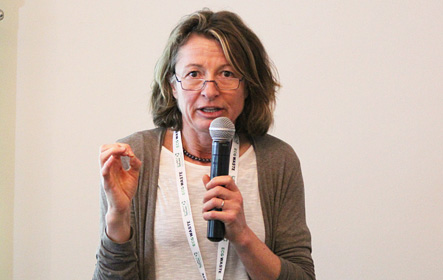 |
| Barbara Breitschopf, Fraunhofer Institute for Systems and Innovation Research (ISI) |
|
 |
 |
 |
 |
|
|
 |
 |
 |
 |
On Tuesday, 20 January 2015, IRENA organized a number of events at the World Future Energy Summit (WFES) including, “Mini-grids outlook: policy and technical innovation”, “Gulf Cooperation Council (GCC) regional energy market analysis”, “A framework for enhanced renewable energy technology adoption in developing countries”, “The next generation of renewable electricity policies: how rapid change is breaking down conventional labels”, “Renewable energy knowledge – global challenges” and “Financing small scale renewable energy projects”.
During the session on mini-grids outlook, a panel discussed the importance of mini-grids as well as the challenges to their implementation, such as the need for additional battery storage since it is the highest cost item. During the session on GCC regional energy market analysis Rabia Ferroukhi, IRENA, moderated the session, and said that growing demand for energy in the GCC region coupled with reduced earnings from fossil fuel exports is driving a need for energy diversification through renewables.
In the session on a framework for enhanced renewable energy technology adoption participants discussed possible means of technology transfer to developing countries and heard a report on the Localization of Clean Energy Technologies in Africa project.
Participants in the next generation of renewable electricity policies session heard a presentation from Salvatore Vinci, IRENA, on ‘Adapting Renewable Energy Policies to Dynamic Market Conditions’, highlighting that policies have driven advances in renewable energy markets but that one difficulty is integrating renewables into the grid system.
During the renewable energy knowledge session, participants discussed the diversity of the renewables sector, and highlighted, inter alia, and the importance of long-term and differentiated policy frameworks to sustain and increase investment levels, the imperative of new systems to organize the explosion of climate and energy knowledge and the need to improve data collection.
On financing small-scale renewable energy projects, session participants noted impressive growth in investment in the last few years but that there is still a need to find financing solutions for small-scale renewable energy projects.
 Visit the web coverage for Tuesday, 20 January 2015. Visit the web coverage for Tuesday, 20 January 2015.
 Download the summary report of the IRENA Events at WFES in HTML or PDF format. Download the summary report of the IRENA Events at WFES in HTML or PDF format. |
|
 |
 |
 |
 |
 |
 |
 |
 |
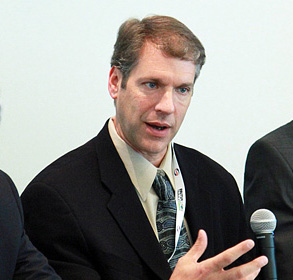 |
| Daniel Kammen, University of California - Berkeley |
|
 |
 |
 |
 |
|
|
|
 |
 |
 |
 |
On Wednesday, 21 January 2015, participants at the World Future Energy Summit (WFES) attended a number of IRENA events including, “Financial instruments and approaches to address the risks and barriers of investing in renewable energy - practical ways toward implementation”, “Evaluating renewable energy manufacturing potential in the Mediterranean partner countries” and “Renewables Readiness Assessment (RRA): analyzing impacts & readiness for investment in sustainable energy”.
During the session on financial instruments, Aleski Lumijärvy, IRENA, presented findings from IRENA’s analysis on risks and barriers of investing in renewable energy and the effective utilization of risk mitigation instruments. He noted that most risk mitigation instruments are underutilized due to a lack of user demand. Key findings in the analysis, he said, include the need to address: elevated investment risks in developing countries; tailored risk instruments; and liquidity risks. During the following discussion, participants addressed the need to reconcile cultural differences between investors and developers and underlined the importance to IRENA of building ties with the private sector. They also discussed the appropriate roles of the public and private sectors, the challenge of scaling up risk mitigation instruments and the need for conventional power to reflect its true costs.
In the session on evaluating renewable energy manufacturing potential in the Mediterranean, participants discussed means of ensuring competitiveness of locally manufactured products against cheaper imported options from China and the need to enhance public sector involvement and cooperation.
During the Renewables Readiness Assessment session, Gürbüz Gönül, IRENA, presented an analysis of the RRA conducted to date. He highlighted IRENA’s facilitative role in these country-driven, multi-stakeholder assessments that identify obstacles to renewable energy development on the ground and recommend policy solutions.
 Visit the web coverage for Wednesday, 21 January 2015. Visit the web coverage for Wednesday, 21 January 2015.
 Download the summary report of the IRENA Events at WFES in HTML or PDF format. Download the summary report of the IRENA Events at WFES in HTML or PDF format. |
|
 |
 |
 |
 |
| Funding for coverage of these events has been provided by IRENA
|

|
|
|